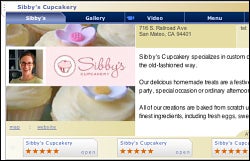 |
Source: Smalltown |
SAN MATEO, Calif. — You might think “everyone” is on the Web, but when it comes to small businesses that’s often not the case.
Much as they might appreciate the benefits of having an online presence to reach more customers, the truly small mom-and-pop operations often don’t have the time, resources or expertise to create and manage a Web site.
“After more than a decade of the Internet, it’s surprising that developing an effective online presence is still such a challenge for small businesses,” said Greg Sterling, principal of Sterling Market Intelligence, a research firm that studies the Internet.
Enter Webcards.com from San Mateo, Calif.-based Smalltown.
Smalltown launched in 2006 with a service for five local communities in and around the company’s San Mateo headquarters. Local businesses pay $600 annually for Webcard setup and design assistance.
Launched nationally yesterday, Webcards allows small businesses to create an instant, portable Web presence.
Webcard listings are a hybrid of Yellow Page ads and multimedia Web sites. They can work on their own or be embedded into other Web pages. When a merchant makes changes to its Webcard listing, they’re instantly reflected wherever the Webcard listing appears on the ‘Net.
“Anyone in the world can make a Webcard,” Hal Rucker, Smalltown’s founder and CEO, told Internetnews.com during a demo of the service here. Webcards are priced at $9.50 per month or $75 per year.
A point-and-click setup screen is designed to facilitate adding photos, videos or coupons to your Webcard.
Rucker said the hands-on interaction with local merchants helped Smalltown figure out what works best. Yesterday’s launch expands the model on a self-service, lower-cost basis.
Each Webcard listing has a unique Web address and is indexed by Google, Yahoo and other search engines. The self-publishing tool, called Webcard Factory, is designed as a step-by-step way for merchants to create a Webcard and get online in as little as 10 minutes, the company said, with such features as photo galleries, video and coupons.
In addition, Smalltown plans to add capabilities such as call tracking, appointment calendars and outbound audio messages.
Rucker said Smalltown gets compared most to Craigslist and Yelp, but he sees distinct differences. “Craigslist is a community forum, not an advertising forum,” he said.
“Also, we brag about how pretty and fun our video and rich content are. “Craigslist is the opposite, where it’s text and links to content.” He noted a certain charm in amateur video ads. “Sometimes the worse they are, the better.”
As for comparisons to Yelp, Rucker said Smalltown is much more focused on merchant-generated content. “Yelp is a vibrant online community where they do user-generated content like crazy,” he said.
Just as Yelp has user-written reviews, Webcards include a Discussion tab where users can add comments on a company’s products or services, noting whether the pizza was tasty, the restaurant’s service was courteous and so on.
But Rucker concedes Yelp is better as a reviews site. “It might even make sense to partner with them at some point,” he said.
As part of the launch, Smalltown announced integration with three other companies: YellowPagesLive, Trulia and Webvisible.
“About half of small businesses don’t have Web sites, and those that do have difficulty changing them,” said Carey Ransom, vice president of sales and marketing at WebVisible. “Webcards are a compelling destination to drive online and search engine advertising campaigns.”
Webcards are launching at a time when local online ad spending is poised for major growth. A report earlier this year by Jupiter Research said local online ad spending, led by display and search-related ads, will increase 82 percent in the next five years.
One of the reasons for the growth cited in the report is the continued improvement major search engines are making in finding local services.
By 2012 advertisers will spend $8.9 billion on local online ad placements, consisting of display, search and classified ads, according to Jupiter Research. That’s up from $4.9 billion in 2007.


